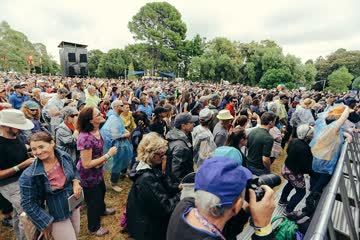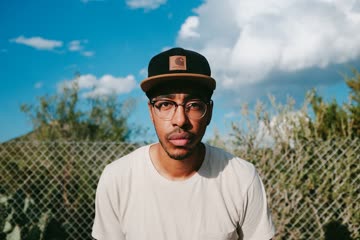Yungblud Wants To ‘Scare The Sh*t Out Of Pop Stars’
“My mission is to bring truth to modern music.”


Dominic Harrison is one of the most famous people in the world. By making music as Yungblud, the South Yorkshire artist has over 8 million monthly listeners on Spotify and over 3 billion global streams. It’s easy to see why he’s so popular – he’s the voice of a generation, unafraid to discuss gender, sexuality, identity, friendships, and mental health.
When I catch up with Harrison, he is back from playing Rock en Seine and V and B festivals in France, two shows that were insane. “France is breaking for us at the moment; I can't believe it. It's like, it's going crazy. And in a country that doesn't even speak our language. We were going on at like 8pm to 50,000 people. It's been wild,” he says.
Harrison flew from Paris to Leeds Festival in the UK to perform his collaborative track with Bring Me The Horizon, Obey. Spurring on the audience with a “YORKSHIRE” chant, he commanded a massive crowd alongside Bring Me vocalist, Oli Sykes. “What was so cool [about the performance] was I saw them since the early days, and to be able to step out at headline Leeds Festival with them and sing with them to 40,000 people is just fucking electric.” Harrison seemed right at home within the breakdowns and death growls.
As well as Sykes, Harrison maintains a close friendship with Fontaines D.C. singer Grian Chatten, who texts him during our interview. “I just think real recognises real, don’t it?” he grins. It's not surprising that Harrison is friends with an Irish post-punk band currently making waves, at least not to me. Why wouldn't he get along with other people making music around his age? "Yeah, we come from completely different ends of the spectrum, but we're the same. We're both talking about our middle-class experiences and having fun while doing it. I think Fontaines are brilliant, innovative, and fresh.”
This July, Yungblud returned to Australia for the first time since the COVID-19 pandemic began. “You guys were first on me, you know?” Harrison notes proudly about Aussies giving anyone a go. “It almost feels like a homecoming every time I come back. It sounds bizarre, but I feel really at home in Australia.” Alongside his band, Yungblud happens to do everything first in Australia: first radio show (of the year), first television appearance, and this time around, the first arena show in Melbourne. According to Harrison, we must always come first because we’re ahead in the time zone.
Don't miss a beat with our FREE daily newsletter
Harrison pulls strength from the past. On his new self-titled album, he’s received mentorship from Ozzy Osbourne; there are nods to Billy Idol and a The Cure sample – “I've got Robert Smith's email, and it’s fucking mad,” he exclaims. “I love rock music. I love old music. I listen to it more so than new music. My mission is to bring truth to modern music. You know, I think music that gets really popular doesn't have a lot of truth in it. I think there's so much to be learned from the past. If I can make that sound modern, make that feel new, and make the stories within it tell the tale of a modern generation, then I’ve cracked it. That's my goal.”
“My life [inspired the influences] on the new album; I just want to make music that me and my mates listen to,” Harrison says. He adores The Cure, Joy Division, Siouxsie & The Banshees, The Smiths, and Oasis. Two of the highlights on the album, the synth-laden, bass-driven, Sex Not Violence and gothic, post-punk banger Boy In A Black Dress, are close to his heart and guaranteed to become staples in the Yunglud set.
“There's such complicated oppression going on in the world right now. And I thought there was something so beautifully simple about the feeling you get from sex. I don't think it's talked about enough," Harrison shares about Sex Not Violence. Despite our strides towards sexual liberation in the world, he is stunned that no one actually talks about the energy, euphoria, connection, trust and magic between two, three, four, or however many consenting people – whatever you’re into. Boy In A Black Dress is made from a smaller, more personal message; it’s the purest song in the Yungblud catalogue so far.
Boy in a Black Dress has magic oozing out of it. “I remember the night we wrote that,” Harrison smiles. “It was late, and we went through the night; candles were burning, and I cried and opened myself up. You can hear it when it goes, ‘I know you don't want to lie anymore, but you feel so bad / it gets me every time.’” Harrison uses music to communicate. He uses the energy inside him to perform, and he’s often misunderstood away from the stage. “It’s a thing I do when I’m not performing, like ‘hello, I’m dumb', but that's a defence mechanism for me.”
Yungblud’s supporters, The Black Hearts Club, are a community. They're not fans, and Harrison doesn't consider himself a musician. “I’ve got these tattoos on my fingers,” he shows me, where the title of The Black Hearts Club originated. Now, all over the world, there are people with matching tattoos and homemade posters for concerts. “I don’t care about how many records I sell; I care about how many people I walk out to. The show isn't about me; it's about [the audience]."
Harrison's care for his community further influences his beliefs, to the point where he wants to destroy the pedestal anyone tries to put him on. “I don’t want to be on a pedestal; I’m not interested,” he says. “I’m here to scare the shit out of fucking pop stars because I think it's all bollocks. It’s all bollocks. I write music to belong somewhere. I write music to connect to people.” And if you look out into any crowd Harrison plays to, it's clear he is very much connecting.







